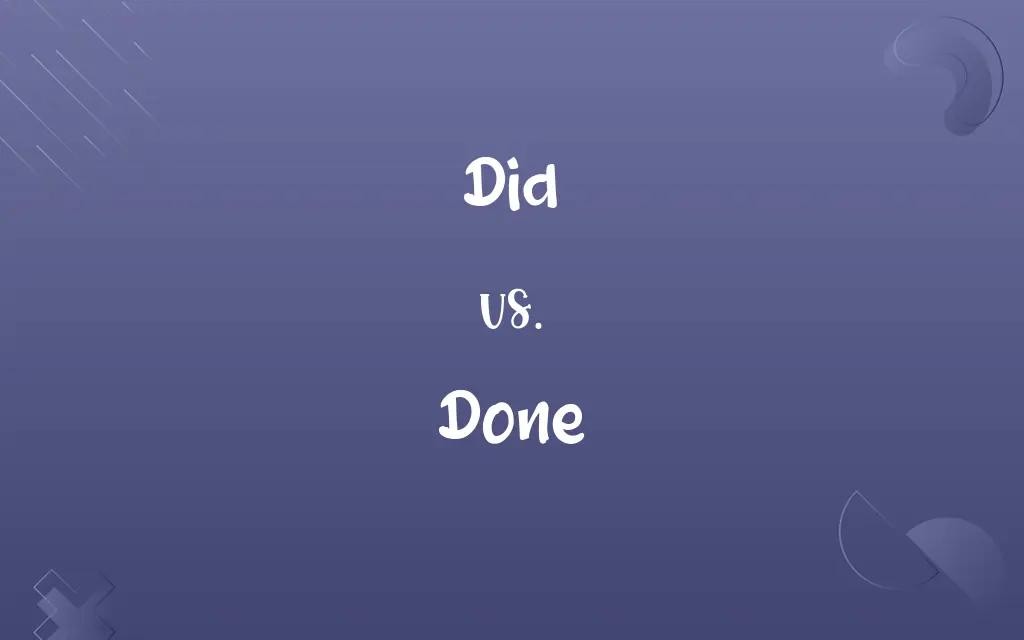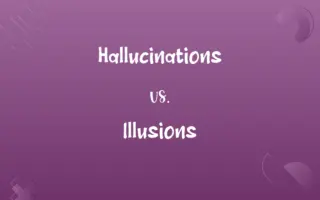Did vs. Done: Know the Difference

By Shumaila Saeed || Published on January 13, 2024
"Did" is the past tense of "do," used for actions completed in the past, while "done" is the past participle of "do," used in perfect tenses or as an adjective.

Key Differences
"Did" functions as the simple past tense of the verb "do," indicating an action completed at a specific time in the past. "Done" is the past participle form, used in perfect tenses (like present perfect) or as an adjective.
Shumaila Saeed
Jan 13, 2024
In sentences, "did" is used as the main verb to describe past actions. "Done" requires an auxiliary verb (like has/have/had) and is used to indicate an action that was completed at an unspecified time.
Shumaila Saeed
Jan 13, 2024
"Did" is often used in forming questions and negative sentences in the simple past tense. "Done" appears in questions and negatives in perfect tense constructions, typically following "has," "have," or "had."
Shumaila Saeed
Jan 13, 2024
"Did" emphasizes the action itself and its completion in the past. "Done" focuses on the state of being completed, often without specifying when.
Shumaila Saeed
Jan 13, 2024
While "did" is purely a verb, "done" can also function as an adjective, describing something that is finished or completed.
Shumaila Saeed
Jan 13, 2024
ADVERTISEMENT
Comparison Chart
Function in Sentence
Acts as main verb
Used as part of verb phrase or adjective
Shumaila Saeed
Jan 13, 2024
ADVERTISEMENT
Negative Sentence
"He did not go to the store."
"He has not done his chores."
Shumaila Saeed
Jan 13, 2024
Did and Done Definitions
Did
"Did" indicates an action completed at a specific past time.
They did the project last week.
Shumaila Saeed
Dec 17, 2023
ADVERTISEMENT
Done
"Done" is used with auxiliary verbs to form perfect tenses.
I have done my research.
Shumaila Saeed
Dec 17, 2023
Did
"Did" is used in forming past tense questions.
Did you visit the museum?
Shumaila Saeed
Dec 17, 2023
Did
"Did" appears in negative sentences in the past tense.
He did not attend the meeting.
Shumaila Saeed
Dec 17, 2023
Done
Socially acceptable
Spitting on the street is just not done in polite society.
Shumaila Saeed
Dec 13, 2023
Done
Having completed or finished an activity.
He pushed his empty plate away, sighed and pronounced "I am done."
They were done playing and were picking up the toys when he arrived.
Shumaila Saeed
Dec 13, 2023
Done
(of an activity or task) Completed or finished.
I'll text you when the movie's done.
Shumaila Saeed
Dec 13, 2023
Done
(of food) Ready, fully cooked.
As soon as the potatoes are done we can sit down and eat.
Shumaila Saeed
Dec 13, 2023
Done
Being exhausted or fully spent.
When the water is done we will only be able to go on for a few days.
Shumaila Saeed
Dec 13, 2023
Done
Without hope or prospect of completion or success.
He is done, after three falls there is no chance he will be able to finish.
Shumaila Saeed
Dec 13, 2023
Done
Fashionable, socially acceptable, tasteful.
I can't believe he just walked up and spoke to her like that, those kind of things just aren't done!
What is the done thing these days? I can't keep up!
Shumaila Saeed
Dec 13, 2023
Done
Used in forming the perfective aspect; have.
I woke up and found out she done left.
Shumaila Saeed
Dec 13, 2023
Done
It is done or agreed; let it be a match or bargain; - used elliptically.
Shumaila Saeed
Dec 13, 2023
Done
Given; executed; issued; made public; - used chiefly in the clause giving the date of a proclamation or public act.
Shumaila Saeed
Dec 13, 2023
Done
Having finished or arrived at completion;
Certain to make history before he's done
It's a done deed
After the treatment, the patient is through except for follow-up
Almost through with his studies
Shumaila Saeed
Dec 13, 2023
Done
"Done" appears in questions and negatives in perfect tenses.
Have you done your chores?
Shumaila Saeed
Dec 17, 2023
Repeatedly Asked Queries
Can "did" be used without an auxiliary verb?
Yes, "did" is used without an auxiliary verb.
Shumaila Saeed
Jan 13, 2024
Does "done" always need an auxiliary verb?
Yes, "done" requires an auxiliary verb in verb phrases.
Shumaila Saeed
Jan 13, 2024
How is "done" used as an adjective?
"Done" describes something that is completed, as in "The cake is done."
Shumaila Saeed
Jan 13, 2024
How is "done" used differently from "did"?
"Done" is the past participle of "do," used in perfect tenses and as an adjective.
Shumaila Saeed
Jan 13, 2024
Is "did" used in questions?
Yes, "did" is commonly used in past tense questions.
Shumaila Saeed
Jan 13, 2024
Can "did" appear in negative sentences?
Yes, "did" is used in negative past tense sentences.
Shumaila Saeed
Jan 13, 2024
Can "did" be used for any subject?
Yes, "did" can be used with any subject.
Shumaila Saeed
Jan 13, 2024
What tense is "did" associated with?
"Did" is used in the simple past tense.
Shumaila Saeed
Jan 13, 2024
What is an example of "did" in a sentence?
"They did their chores yesterday."
Shumaila Saeed
Jan 13, 2024
Can "did" and "done" be interchangeable?
No, they serve different grammatical purposes and are not interchangeable.
Shumaila Saeed
Jan 13, 2024
Is "done" subject-specific?
No, "done" can be used with any subject but requires an auxiliary verb.
Shumaila Saeed
Jan 13, 2024
What is the question form for "done"?
"Have you done your work?" is an example of a question form for "done."
Shumaila Saeed
Jan 13, 2024
Do "did" and "done" mean the same thing?
No, they have different uses and forms in grammar.
Shumaila Saeed
Jan 13, 2024
Can "done" stand alone as a verb?
No, "done" cannot stand alone; it needs an auxiliary verb.
Shumaila Saeed
Jan 13, 2024
Is "done" used in negative sentences?
Yes, but with an auxiliary verb, as in "I have not done my homework."
Shumaila Saeed
Jan 13, 2024
Does "done" have a specific time reference?
No, "done" does not specify when the action was completed.
Shumaila Saeed
Jan 13, 2024
Share this page
Link for your blog / website
HTML
Link to share via messenger
About Author
Written by
Shumaila SaeedShumaila Saeed, an expert content creator with 6 years of experience, specializes in distilling complex topics into easily digestible comparisons, shining a light on the nuances that both inform and educate readers with clarity and accuracy.








































































